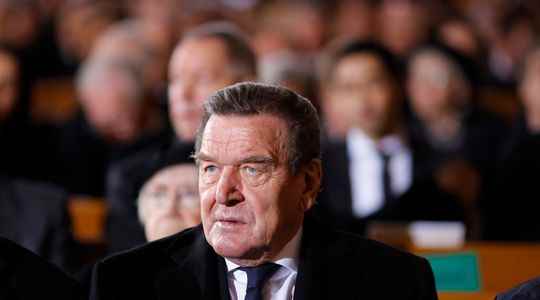Will the Social Democrats accept for a long time to see Gerhard Schröder ruin their foreign policy? The former chancellor (1998-2005) suddenly returned to the forefront of the political scene by defending his great friend Vladimir Putin. Chairman of the supervisory board of the Russian oil giant Rosneft, he had no qualms about reversing the roles in the Ukrainian crisis by cynically asking Kiev to “stop the noise of boots” in the face of the 100,000 Russian soldiers posted at the borders.
In the service of Moscow for sixteen years, Gerhard Schröder remains the chief lobbyist for Russian gas in Germany. The former chancellor was the initiator – while he was still in office – of the construction of the Nord Stream 1 gas pipelines and, more recently, Nord Stream 2. This infrastructure, not yet commissioned, could make the subject to Western sanctions, in case Moscow decides to attack Ukraine.
“Employee of Putin”
“Gerhard Schröder is Putin’s employee. And like any employee, he has no influence over his boss,” summarizes Markus Linden, political scientist at the University of Trier and member of the SPD. But on the other hand he retains an aura in his country as the father of the “second German economic miracle”. “Despite this, the Social Democratic Party must absolutely distance itself,” warns Markus Linden.
The conservative opposition did not fail to react to his pro-Putin statements by stigmatizing the toxic friendship he has with the Russian president. Christoph Ploss, chairman of the Hamburg CDU, demanded that the office in Berlin to which he was entitled as former chancellor, along with several assistants, drivers and bodyguards, be withdrawn. “Taxpayers do not have to finance the lobby work of the Russian state in Germany,” he asserts. And what does the German left say? “There is only one chancellor and that’s me,” said Olaf Scholz, visibly annoyed by the exit of his predecessor. Received at the White House next Monday, the new chancellor who, until now, was rather conspicuous by his absence in the Ukrainian crisis, should then go to Moscow. As for Lars Klingbeil, the new chairman of the SPD, he hides behind freedom of speech. “Many are those who express themselves”, he repeats simply. The Social-Democratic Chairman of the Foreign Affairs Committee of the Federal Assembly (Bundestag), Michael Roth, only saw fit to contradict the former Chancellor – without, however, naming him – by considering that the need for protection of the Ukraine was “understandable” and that it had “nothing to do with the sound of boots”.
Nostalgia for “Ostpolitik”
The idea that the United States and NATO have ignored Russia’s security concerns for too long is widespread on the German left. In the SPD, there are still many “Putin-Versteher” (Putin’s “understandings”) favorable to the continuation of the “Ostpolitik” of their 70s idol, Willy Brandt. For fear of breaking off the dialogue, Berlin has never taken real retaliatory measures against Moscow, whether after the attempted assassination of opponent Alexei Navalny (treated in Berlin) or the execution of a Chechen opponent in the heart of the capital and sponsored by Moscow, according to German justice (only two Russian diplomats were expelled). “You will find on the left wing of the party an anti-Americanism which is stronger than the fear of Russia”, analyzes Stefan Meister, political scientist at the German Institute for Foreign Policy.
The Nord Stream 2 gas pipeline is the symbol of this “constructive dialogue” which led Germany to become hostage to Moscow. Like Angela Merkel, Olaf Scholz has always defended a “purely private” project by avoiding politicizing a geostrategic file. Manuela Schwesig, the great female hope of the SPD, fought against winds and tides for the completion of this gas pipeline which leads to the coasts of the Baltic Sea, in the region which she leads, Mecklenburg. To carry out the end of the project, she did not hesitate to circumvent American sanctions by creating a screen foundation at home and financed by… Gazprom, the Russian gas giant.
Fairy tale
As the new government aspires to political leadership in Europe, Germans are relieved to see French President Emmanuel Macron filling the void in the Ukraine crisis. “Since the end of the war, the question of external security has never been discussed in Germany”, regrets the liberal Marie-Agnes Strack-Zimmermann (FDP), president of the Defense Committee of the Federal Assembly ( Bundestag).
She quotes for this the former Social Democratic President Johannes Rau who said in the 2000s: “Germany is surrounded by friends”. Despite Putin’s aggressive policy, the Germans still refuse to come out of this fairy tale.
